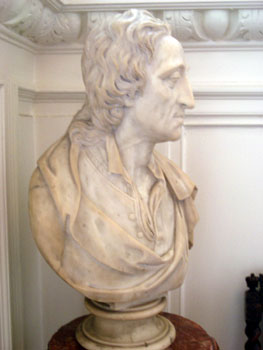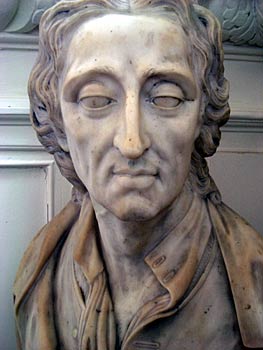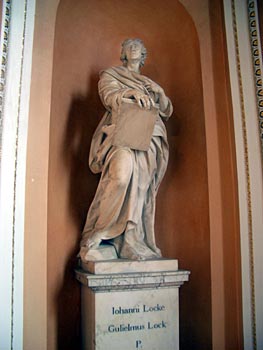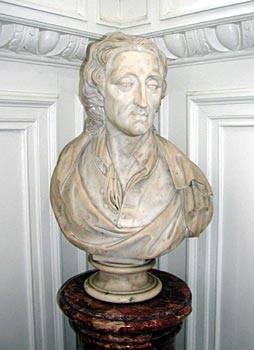 |
Wrington ARCHIVE LOCKE’S LIFE AND WORKS Dr. Andrew Woodfield Reader in Philosophy, University of Bristol |
 |
 |
Wrington ARCHIVE LOCKE’S LIFE AND WORKS Dr. Andrew Woodfield Reader in Philosophy, University of Bristol |
 |
 |
 |
||||||
| Commemorating the Tercentenary of the Death of John Locke' at Wrington Parish Church, Thursday 28th October 2004 |
|||||||
| John Locke, one of the greatest of Western philosophers, was born in 1632 a few yards from where we now find ourselves. This boy from a Somerset Puritan family, who in his later years acquired considerable fame, came to be recognised from the 18th century onwards as a founding father of the Enlightenment. On the two hundred and fiftieth anniversary of his death, the political philosopher Peter Laslett described him as ‘a thinker of thoughts now woven into the intellectual traditions not of our country only but also of the whole world, of France and of the United States perhaps even more than of Britain’ (Laslett 1954). The statement remains just as true today, on the three hundredth anniversary. Locke’s life-span (1632 – 1704) coincided almost exactly with that of Samuel Pepys (1633-1703). He lived through the beheading of Charles I, the Parliament of Cromwell, the restoration of Charles II as monarch, the Great Fire of London, the Plague, the flight of the Catholic king James II, the arrival of the Protestant William III. If we survey only the surface of his life, we miss what’s important. Cranston’s masterly biography published in 1957 brings this out very clearly. Locke was not a politician or soldier. He did not strut at the front of the historical stage. He worked behind the scenes by writing, by giving wise advice, by influencing people’s intellectual and moral attitudes. Locke started his adult career as a Classics don. He was an amateur scientist who became interested in medicine. At the age of 34 he got a job as personal physician and political secretary to a very important person. This was Lord Ashley, leader of the Whig party. As it turned out, Locke started off on the right foot by saving his employer’s life. Lord Ashley suffered from a suppurating cyst in the liver. Locke devised a way of draining the fluid by implanting a silver tube in Ashley’s abdomen. It worked, and Lord Ashley was grateful. Locke made it his business to keep up with the latest scientific discoveries. He talked with scientists, he collaborated with the physicist Boyle and the physician Sydenham. When Lord Ashley’s ministerial career took off, some important briefs fell to Locke. He wrote papers about how to handle public finances, and he drew up the constitution for the government of Carolina. As Secretary to the Council of Trade and Plantations he was involved in administering the American and Caribbean colonies. He joined the newly formed company of merchant adventurers in 1672, the year that Lord Ashley became Earl of Shaftesbury. During their long association which lasted up to Shaftesbury’s death in 1683, Locke took one career- break in order to get medically qualified, and another four year break in France, where he met and befriended a number of French scientists and philosophers. In 1683, however, because of his association with the radical party, he came to be viewed as a potential threat to the Catholic Charles II. Locke thought it prudent to disappear from London for a while. He returned in 1688, when William and Mary sailed over from Holland to ‘deliver England from Popery’, and from then on, despite bad asthma that made him cough, Locke threw himself into public service until his health failed and he died, aged 72. That is a brief summary of the surface career. His true greatness, however, is to be found in the things he found time to write. Very little was published until 1690, when Locke felt that it was safe to do so. Even then, the only book that had his name on the title page was The Essay Concerning Human Understanding. This paradigm of British Empiricism argues that every person’s understanding of the world derives from perceptual experiences and reflections, not from pure intellect, nor from revelation, nor from an outside authority. Two Treatises of Government appeared anonymously in the same year, as did A Letter Concerning Toleration. In 1693 he published Some Thoughts Concerning Education, based on advice dating back to 1684 concerning the education of a friend’s son. Then in 1695, The Reasonableness of Christianity came out, again anonymously. What are the qualities in Locke that make us rate him so highly? Why is he the source of so much interest? Three factors stand out. * The quality and subtlety of his thinking replays careful study. The fact that some passages allow themselves to be interpreted in more than one way gives rise to lively debates amongst scholars. * The fact that there is a huge amount of unpublished material, not all of it sifted yet, means that new clues can still be found as to his intentions and motives, as well as to the details of his life. Locke was an early champion of liberal democracy. He held that a government is not legitimate unless it has the consent of the governed. Its only business is the protection of citizens' rights to property and security. He argued that 'all civil power, right, and dominion, is bounded and confined to the only care of promoting these things; and that it neither can nor ought in any manner to be extended to the salvation of souls' (Essay on Toleration). A government should keep the peace and protect people’s property, not poke its nose into their religious beliefs. Locke inspired the doctrine of the separation of Church from State that is enshrined in the US Constitution. This theme has special topicality for us. Currently, there is controversy surrounding the appointment of a new set of EU Commissioners. Rocco Buttiglione, Italy’s candidate for commissioner for Justice, Freedom and Security (the BBC calls him the ‘philosopher-commissioner’), holds strongly Catholic views on social issues. For example, he is on record as saying that homosexuality is a sin. Locke thought that a person’s religion should be no bar to their holding public office unless the religion required them to devote primary allegiance to a foreign state. On these grounds he was not happy about having Catholics in government in England; for he thought that if a conflict of duty were to arise, Catholics would obey the Pope rather than the King. But I think he would have approved of a Catholic who believed that religion should be kept out of politics. Let us turn to the second factor: Locke’s thinking is rich and sophisticated, allowing ample scope for debates concerning interpretation. One of the key contributions he made to political theory was his ‘labour theory of property’. It is an example of a theory that can cut more than one way. Here and in what follows I am indebted to a paper by the Canadian philosopher James Tully (1994), entitled ‘The Two Treatises and Aboriginal Rights’. Locke believed that the Creator had given the earth and its products to mankind for everybody to use and enjoy. When humans first arrive in a vacant territory, the plants and animals living there are not owned by anyone. He used the term ‘the state of nature’ to describe the evolutionary phase occupied by groups of human hunter-gatherers prior to the setting up of any settled institutions and laws. In the state of nature there is no hierarchy of masters and servants, no such thing as rulers and ruled. Everyone is ‘free, equal and independent’ (Second Treatise ch VIII, s 95). Initially no one owns anything. Nature’s bounty is held in common. But as soon as a person begins to work on an object, fashioning a branch, chipping a flint, or catching a fish, the object acquires a new status: it becomes the agent’s property. The agent has a natural right to keep it; other people ought not to deprive him of it; to take the object away counts as stealing. Property rights and duties exist before any man-made laws or conventions have been set up. Locke’s reasoning is to be found in the 2nd Treatise on Government, chapter V: ‘Though the earth, and all inferior creatures, be common to all men, yet every man has a property in his own person: this nobody has any right to but himself. The labour of his body, and the work of his hands, we may say, are properly his. Whatsoever then he removes out of the state that nature hath provided, and left it in, he hath mixed his labour with, and joined to it something that is his own, and thereby makes it his property… For this labour being the unquestionable property of the labourer, no man but he can have a right to what that is once joined to, at least where there is enough, and as good, left in common for others…. It is the taking any part of what is common, and removing it out of the state nature leaves it in, which begins the property; without which the commons is of no use. And the taking of this or that part does not depend on the express consent of all the commoners… If the consent of others were needed before a person could appropriate any of the bounty of nature, everybody would starve.’ Locke is here talking about the individual’s right to appropriate fruits of the land. What about the land itself? Yes, he says, ’property in that too is acquired as the former. As much land as a man tills, plants, improves, cultivates, and can use the product of, so much is his property. He by his labour, does, as it were, enclose it from the common. Nor will it invalidate his right, to say everybody else has an equal title to it, and therefore he cannot appropriate, he cannot enclose, without the consent of all his fellow-commoners. Nor was this appropriation of any parcel of land, by improving it, any prejudice to any other man, since there was still enough, and as good left; and more than the yet unprovided could use. So that, in effect, there was never the less left for others because of his enclosure for himself: for he that leaves as much as another can make use of, does as good as take nothing at all.’ Now Locke’s reasoning is premised on the assumption that the people are living in a state of nature in a region of abundant unclaimed land. He thought that this truly described some of the colonies. He took the America of his day as a model of the state of nature, saying ‘In the beginning all the world was America’ (ch V section 49). The right to appropriate a bit of land and its products did not apply in 17th C England, in Locke’s view. In England, there existed a system of government that was already highly organised. People lived in permanent settlements, and had set up laws regulating property. Children could legally inherit land from their parents. The amount of common or vacant land was limited. Most of the country had been enclosed and worked on. Thus nearly every plot would have a prior claim on it by an existing legal owner. The distinction Locke drew is familiar to us. One is free to pick blackberries on Felton Common, but not free to pick them from a private garden. Why? Because the garden blackberries already belong to someone. In Locke’s day, you could fish freely in the ocean, ‘that great and still remaining common of mankind’ (as he called it). No one owned the wild fish; the fish that you caught became yours when you caught them. But in our day, you certainly have no right to take the fish in Blagdon Lake. The trout there belong to Bristol Water Company (which itself is owned by the American company Enron based in Houston, Texas). The owners charge fishermen for the privilege of casting a line, and they limit the size of the catch. Was it really true that the Carolinas and Virginia were vacant lands in Locke’s day? The early colonists certainly had no compunction about appropriating great tracts. Many settlers said, citing Locke’s account of property, that they had a natural right to that land and that it pleased God that they should improve it. After all, Locke had written in the Second Treatise, ‘God gave the world to men in common; but since he gave it them for their benefit, and the greatest conveniences of life they were capable to draw from it, it cannot be supposed he meant it should always remain common and uncultivated. He gave it to the use of the industrious and rational (and labour was to be his title to it).’ The difficulty is that much of the land in America already had indigenous inhabitants. Wouldn’t the Native Americans have been the rightful owners? According to Tully (1994), a Lockean case can be made for the opinion that the Indians did indeed have a prior claim, and that the colonists were thieves and usurpers. What was Locke’s own view? It would be wrong to accuse Locke of cynically devising a theory of property that was deliberately intended to justify the theft of Indian lands. He was never an apologist for injustice. His view was rather this: that the native inhabitants had rights to the fruits and nuts they picked and the game they killed, but they did not own the land itself, because they had not made enough of a mark to qualify as having ‘mixed their labour’ with it. Locke believed sincerely that in the interior the Indians had created no permanent settlements, had enclosed no plots, and had not cultivated or improved the land. America inland from the coast was therefore still terra nullius (vacant land), waiting for industrious people to claim it. Yet, on the other hand, Locke provided a theoretical framework within which it is possible to argue that the indigenous people should be deemed the rightful owners of the land. For suppose that some tribes had mixed their labour with their lands. Then it would follow from Locke’s labour theory that those people had a natural property right. Quite a bit hinges upon the way in which the Indians treated nature. As we now know, their tribal societies were highly developed, though structured differently from European societies. Their world-view is intelligible to us. They had laws, they respected property, they regarded certain places as sacred, and it could be said that they expended labour, including intellectual and spiritual labour, upon steering the land. They husbanded it less crudely than the settlers. Their aim was not to drive the land hard. They had ways of working with nature without upsetting the ecological balance. This could surely count as ‘mixing one’s labour’ with the land. Locke does not define precisely what he means by this phrase. His notion of labour certainly is not limited to manual labour, it also covers intellectual activities, art, music, and scientific inventions. The radical interpretation can be pushed still further. Not only did the Native Americans in the 17th century own America, according to Locke’s theory of property, but also Locke’s theory of government implies that they still own it in 2004. Any land occupied by settlers but not granted to them by proper treaties with the Indians qualifies as land taken by conquest. And in the Second Treatise of Government chapter XVI, Locke’s view of such cases is set out as follows: ‘The inhabitants of any country, who are descended, and derive a title to their estates from those, who are subdued, and had a government forced upon them against their free consents, retain a right to the possessions of their ancestors…. For the first conqueror never having had a title to the land of that country, the people who are the descendants of, or claim under those, who were forced to submit to the yoke of a government by constraint, have always a right to shake it off…’ I hope that this discussion of Locke’s views about the owning of land, albeit brief and oversimplified, has shown that his work is relevant to issues that concern us today. On this subject, as on many others, modern thinking has developed out of his. Let us note, too, the enormous quantity of extant material we have that is about Locke or relevant to Locke. There is the collection of his own letters together with letters sent to him by hundreds of friends and acquaintances over a 72-year lifetime. Locke was a careful man who tended not to discard documents. Instead he stashed them in drawers. Three and half thousand letters to and from Locke are held in the Lovelace collection in Oxford's Bodleian Library. . In the public records, such as those stored in the Somerset County Archives in Taunton, there are property deeds, death certificates, marriage certificates and all sorts of documents relating to Locke and his circle of West Country friends; in the Lovelace collection are bills, shopping lists, recipes, gardening tips and so on, records of the circumstantial details of his life. These reveal him to be a tireless note-taker and list-maker. Encyclopedias sometimes say that little is known about his early years in the Chew and Yeo Valleys and the Mendips. His later life, played out on a much wider stage, is so fully documented that his childhood appears under-documented in comparison. But in fact we know a great deal about his Somerset milieu. The correspondence and other sources clearly show that links with this area figured importantly throughout his life. He maintained contact, keeping up with family, visiting old friends, keeping tabs on his clutch of inherited properties dotted around Pensford and Publow. It is tempting to speculate that some of his mature attitudes and doctrines stemmed from experiences supplied by the Somerset environment. There is plenty of scope for this theory. Locke himself would have accepted that a man’s physical and social surroundings influence his thinking. It fits with his view that all our ideas are acquired, not innate. The letters certainly tell us much about his personality and temperament. He comes across as a well-balanced, sociable gentleman, open-minded, non-dogmatic, well-mannered, prudent, circumspect, a bit of a workaholic, with a capacious memory, who gave wise advice. He made up names for himself and his correspondents in case prying eyes intercepted the letters. This practice was widespread, admittedly; but there is no doubt that Locke was by nature secretive. Locke’s greatest friend in later life was Lady Damaris Masham, in whose house he lived. She was the highly intellectual daughter of the Cambridge philosopher Ralph Cudworth. In a letter to his Dutch friend Philip van Limborch written on 13th March 1691, Locke described Lady Masham as ‘well read in theological and philosophical questions, and of such an original mind that very few men could equal her in the abundance of her knowledge and her ability to use it.’ Shortly after Locke’s death, Lady Masham wrote about his life and character in a letter that was published in Le Clerc (1706). She emphasised his powers of judgement, his love of learning from others, his lack of stuffiness. ‘His greatest diversion’, she said, ‘was to discourse with sensible persons, of whose conversation he was very desirous.’ He was discreet: ‘He not only faithfully kept a secret, that had been trusted with him, but would never report anything that might prejudice the person from whom he heard it; though his silence had not been desired..’ His maxim was: ‘Lead those who consult me into no trouble.’ To end this sketch of our great forebear who died three centuries ago, I’d like to convey the flavour of a letter sent from near here to Locke in Oxford in 1658 ( De Beer (ed) (1976) volume 1 p 59. Letter 42). The author was John Maggs, a farmer from Pensford, a friend of the Locke family who acted as witness to the will of Thomas Locke, John’s brother. Although Mr Maggs’s news from the country is not terribly exciting, he ends the letter affectionately, resolving to do something that we should do too. ‘…At Penceford we nothinge but Toyle and labour and sweet, like Asses groaneinge under our burthens, and knowe not how soone wee shall be deprived of those outward Injoyements, but Christs Church is a safe shelter from outward discontentments: I Bibliography Cranston, M. (1957) John Locke: A Biography London, Longmans, Green. De Beer, E.S. (ed) (1976) The Correspondence of John Locke volume 1. Oxford: Clarendon Press. Laslett, Peter (1954) ‘Locke as Founder of the Board of Trade’, from The Listener 52, no.1342 (18 November 1954), pp. 856-57. Reprinted in A Locke Miscellany, edited by Jean S. Yolton, 1990, Thoemmes Antiquarian Books Ltd, Bristol. Le Clerc, Jean (1706) The Life and Character of Mr John Locke, London, printed for John Clark; Lady Masham’s letter reprinted in A Locke Miscellany, edited by Jean S. Yolton, 1990, Thoemmes Antiquarian Books Ltd, Bristol. Tully, James, (1994) ‘The Two Treatises and Aboriginal Rights’, in Locke’s Philosophy: Content and Context, edited by G.A.J. Rogers (Oxford University Press 1994). |
|||||||
 |
|||||||
 |
|||||||